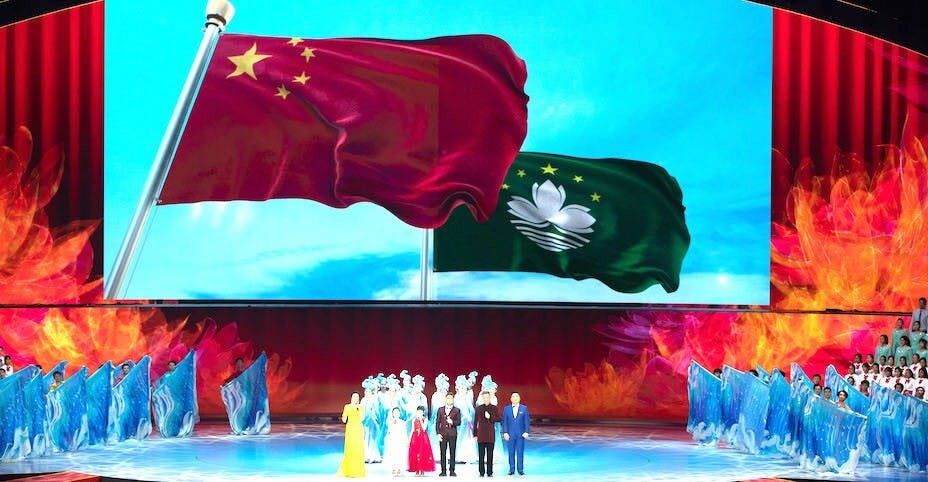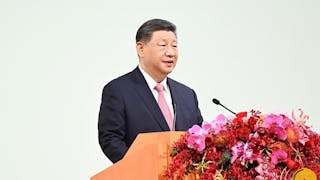11月3日,官方新華社發表《「十四五」規劃和2035年遠景目標的建議》全文(以下簡稱《建議》),這對香港、澳門和台灣的發展同樣具有重要意義。
《建議》的願景,是到2035年,中國經濟實力、科技實力、綜合國力大幅躍升,經濟總量和城鄉居民人均收入再邁上新的台階,關鍵核心技術實現重大突破,進入創新型國家前列;基本實現新型工業化、資訊化、城鎮化、農業現代化,建成現代化經濟體系;基本實現國家治理體系和治理能力現代化,基本建成法治國家;建成文化、教育、人才和體育強國。
此外,《建議》預料到時中國人均GDP達到中等發達國家水平,城鄉區域發展差距和居民生活水平差距顯著縮小,基本實現國防和軍隊現代化。
《建議》提出,要保持香港、澳門長期繁榮穩定,落實中央對特別行政區全面管治權和維護國家安全的法律制度和執行機制,維護國家主權、安全、發展利益和特別行政區社會大局穩定。對於台灣,則提出推進兩岸關係和平發展和祖國統一,堅持一個中國原則和「九二共識」,強調高度警惕和堅決遏制台獨分裂活動。
《建議》不僅概述了「十四五」規劃,還概括了中國共產黨到2035年的遠景目標,包括香港和澳門應如何實施政策和採取措施以實現務實而雄心勃勃的國家目標。因此,港澳兩地政府都必須採取更大膽的措施和更積極的政策。 最重要的是,儘管中國一直在沿海地區發展軍事力量,但《建議》也表明,北京仍然將經濟合作、兩岸人民交流,以及與台北關係的和平發展,視為海峽兩岸議程的重中之重。
China’s 2035 Vision: Implications for Macau Hong Kong and Taiwan
On November 3, the publication of a document suggesting how China formulates the 14th Five-Year Plan plan and achieve its visions in 2035 has important implications for the development of Macau, Hong Kong, and Taiwan.
The entire document has fifteen sections, including an introduction delineating the drafting process from March to August 2020.
The introduction delineates the key principles of the Central Committee of the Communist Party of China (CPC) in formulating the 14th Five-Year Plan plan and its 2035 vision.
First, it adopts the principle of supplementing the areas of how to strengthen the CPC governance, agricultural development, cultural construction, and national security. Second, it analyses the complex changing circumstances and adopts the mentality of “bottom-line thinking.” Third, the principles of treating the people as the central focus, expanding openness and reform, and comprehensively adopting law as a tool to govern China are emphasized. Fourth, the 2035 visions are to “promote mutual affluence” and “narrow developmental gaps.” Fifth, the nation’s innovative system needs to be improved so that China will strengthen its strategic and technological capabilities.
Sixth, the role of “entity economics” in the nation’s economic development is reaffirmed to accelerate modernization. Seventh, the socialist economy must be consolidated, including its financial, tax and monetary systems. Eighth, urbanization and towns development will be accelerated and improved in their governance. Nineth, high quality education will have to be constructed to promote “the comprehensive development of the human beings and the society.” Tenth, national security needs to be strengthened to maintain social stability.
The sections that are applicable to Hong Kong, Macau and Taiwan are sections 57 and 58. Specifically, section 57 focuses on Hong Kong and Macau. First, China’s plan is to maintain the “long-term prosperity and stability of Hong Kong and Macau.” Second, the principles of “one country, two systems” have to be “accurately implemented,” including the tenets of “the Hong Kong people governing Hong Kong,” “the Macau people governing Macau,” “a high degree of autonomy,” and the need to govern Hong Kong and Macau in accordance with the laws. Third, the Chinese constitution and the Basic Law’s constitutional order will have to be carried out. Fourth, the “comprehensive jurisdiction” of the central government on the two special administrative regions must be implemented. Fifth, the legal system and implementation mechanisms of safeguarding national security must be implemented, including the need to “maintain national sovereignty, security, developmental interests and retain the social stability of the special administrative regions.”
Sixth, the central government supports the two special administrative regions to “consolidate and elevate their competitive advantages, construct international innovation and technological centres, build up the functions and platforms of Belt and Road initiatives, and realize economic diversification and sustainable development.” Seventh, the central government supports Hong Kong and Macau to deepen the integration with the nation, to construct high quality Guangdong-Hong Kong-Macau Greater Bay Area, and it improves policy measures that facilitates the residents of Hong Kong and Macau to develop their career in the mainland. Eighth, the Hong Kong and Macau comrades must improve their “national consciousness and patriotic spirit.” Ninth, the central government supports Hong Kong and Macau to develop cooperation and exchanges with other countries and regions. Tenth, the central government “resolutely prevents and curbs foreign forces from intervening in Hong Kong and Macau affairs.”
Section 58 delineates the central government’s principle of “promoting cross-Strait relations, peaceful development and national reunification.” Moreover, it maintains the principles of one China and the 1992 consensus. Adopting the principle of “the welfare of comrades across the two Straits,” the central government promotes the development of cross-Strait relations and peaceful development, integrative development, and the consolidation of industrial cooperation between two sides, as well as the creation of a common market so that “the Chinese nation’s economy will be strengthened and the Chinese culture can be mutually fostered.”
Moreover, the central government “improves the system and policies of protecting the Taiwan comrades to enjoy the same privileges as with mainlanders in the mainland,” supporting Taiwan businesspeople and enterprises to participate in the construction of the Belt and Road initiatives and the nation’s regional developmental strategy. The central authorities support those eligible Taiwan enterprises to be listed in the mainland market, and they back up Fujian to explore new integration paths of the two Straits. Finally, the central government supports the people from the basic level to interact with each other on both sides, including the youth exchanges. Finally, it “is highly vigilant of and resolutely curbs the Taiwan separatist activities.”
The document released on November 3 and China’s vision for 2035 have important implications for the development of Macau, Hong Kong, and Taiwan.
First and foremost, while the central government affirms the need to maintain the long-term prosperity and stability of Hong Kong and Macau, the two places must be aware of how to “accurately” implement the principles of “one country, two systems,” “a high degree of autonomy” and governing the special administrative regions in accordance with the laws. While Macau has seen a very stable society since December 20, 1999, Hong Kong witnessed a relatively socially and politically turbulent environment from 2003 to 2019.
As such, the governing authorities of the Hong Kong Special Administrative Region (HKSAR) must carry out the “one country, two systems” by implementing the national security law. With the enactment of the Hong Kong national security law on June 30, 2020, the HKSAR government’s social stability has returned to normalcy. Section 57 was written in a way that speaks more to Hong Kong than to Macau, strictly speaking. It does not mention that Hong Kong should follow the good example of Macau, but implicitly the Macau model of maintaining social stability should ideally be implemented in the HKSAR. Understandably, the HKSAR government must accelerate its national security education and patriotic curriculum in schools so that the young people’s “national consciousness” and patriotism will be hopefully enhanced.
Second, the central government’s “comprehensive jurisdiction” on Hong Kong and Macau is stressed, implying that Beijing’s sovereignty is of utmost importance. One country’s interests override two systems’ interests. As such, the message again speaks far more to Hong Kong than to Macau, although the section is applicable to both special administrative regions. Interestingly, while the central government supports both Hong Kong and Macau to develop external cooperation, it “resolutely” opposes foreign intervention in both special administrative regions – a reiterated position that again directs at Hong Kong rather than to Macau.
Third, both Hong Kong and Macau are expected to develop their competitive advantages, enhance innovation and technological capabilities, and expand their talents in accordance with China’s 14thfive-year plan of nurturing talents and creating high-quality education systems. Here, the local universities of both Hong Kong and Macau must develop their campuses in the mainland, especially the Greater Bay Area, so that talents will be cultivated, and technological and innovation ability will be nurtured, expanded and maximized. By implication, the local education systems of both Hong Kong and Macau should be reformed so that the two special administrative regions will be able to achieve the national vision of achieving the Belt and Road initiatives.
Given Macau’s strengths in its linkages with the Portuguese-speaking countries, and Hong Kong’s strengths in networking with the common-law countries, both special administrative regions must design their policy addresses and developmental blueprints in accordance with the achievement of the national goals and visions.
Fourth, Macau is encouraged to diversify its economy. The section touches on economic diversification and it implies that Macau must develop its economic sectors away from its overdependence on the gaming industry. As such, Macau must think harder on how to utilize the Hengqin connections to diversify its economy. The Macau government must consider injecting more resources to the local education sectors, improve its governmental think tank, and concretely develop new industrial sectors in the coming years.
If the Greater Bay Area is going to strengthen the development of cultural enterprises, Macau must make use of its rich cultural and historical heritage to organize cultural tours, improve its scenic spots, invest in the maintenance of cultural heritage so that new cultural enterprises may be fostered. If China is emphasizing the green environment and sustainable development, Macau and Hong Kong should also think harder on how to develop the agenda of sustainability. Green vehicles, green buildings, and green finance may have to be developed in a far more assertive and creative manner than before.
Fifth, both Hong Kong and Macau are expected to integrate socially and economically with the Greater Bay Area in a much closer way. The governments of both special administrative regions must adopt a more proactive approach to exploring how to liaise with the authorities of the Greater Bay Area on how to provide more study, work and residence opportunities for the people of Hong Kong and Macau, including the youth and the elderly. Young people are going to be encouraged to study and work in the Greater Bay Area, while elderly people may be encouraged to move to reside in the mainland. But the prerequisite is for both the governments of both Hong Kong and Macau to discuss in detail with the cities in the Greater Bay Area on the technicalities of how to foster such a conducive environment in the first place. As such, preferential policies will have to be developed and implemented.
In the final analysis, section 58 has important implications for Beijing-Taipei relations. Beijing adopts the priority of integrating Taiwan economically, socially, and peacefully rather than using military force. Beijing’s bottom line is very clear: Taiwan must accept the 1992 consensus, the basis of which both sides will move forward so that the Chinese nation’s cultural and economic development will be fostered. Most importantly, “a common market” will hopefully be established between the mainland and Taiwan.
The role of Fujian in building up such a “common market” will be increasingly important, including perhaps new infrastructure projects such as bridges or tunnels that may link up Taiwan’s islands with the Fujian province. Beijing is perhaps waiting for a possible regime change in Taiwan so that a new Nationalist Party president in the island republic will perhaps propel the development of cross-Strait relations in a new manner. Beijing’s united front work on Taiwan remains a top priority amid their apparently tense relationships.
In short, the document published on November 3 outlined not only China’s principles of moving the CPC to the second 100 years of governance but also its visions for 2035, including how Hong Kong and Macau should implement policies and take measures to achieve the pragmatic and ambitious national objectives. As such, it is imperative for both the governments of both Hong Kong and Macau to adopt bolder measures and progressive policies forward. Most importantly, despite the fact that China has been flexing its military muscles along its coastal regions, the messages in Section 58 on Taiwan prove that Beijing is putting closer economic integration, human interactions and peaceful development with Taipei at the top priority of its cross-Strait agenda.
原刊於澳門新聞通訊社(MNA)網站,本社獲作者授權轉載。



































